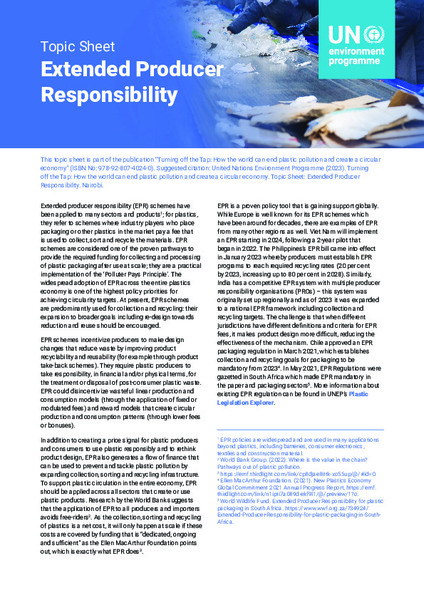Topic Sheet: Extended Producer Responsibility

Date
2023-05Author
United Nations Environment Programme
Citation Tool
Bibliographic Managers
RT Generic T1 Topic Sheet: Extended Producer Responsibility A1 United Nations Environment Programme YR 2023-05 LK https://wedocs.unep.org/20.500.11822/42235 PB AB TY - GEN T1 - Topic Sheet: Extended Producer Responsibility AU - United Nations Environment Programme Y1 - 2023-05 UR - https://wedocs.unep.org/20.500.11822/42235 PB - AB - @misc{20.500.11822_42235 author = {United Nations Environment Programme}, title = {Topic Sheet: Extended Producer Responsibility}, year = {2023-05}, abstract = {}, url = {https://wedocs.unep.org/20.500.11822/42235} } @misc{20.500.11822_42235 author = {United Nations Environment Programme}, title = {Topic Sheet: Extended Producer Responsibility}, year = {2023-05}, abstract = {}, url = {https://wedocs.unep.org/20.500.11822/42235} } TY - GEN T1 - Topic Sheet: Extended Producer Responsibility AU - United Nations Environment Programme UR - https://wedocs.unep.org/20.500.11822/42235 PB - AB -View/Open
Item Statistics
Display item statisticsMetadata
Show full item recordDescription
Extended producer responsibility (EPR) schemes have been applied to many sectors and products; for plastics, they refer to schemes where industry players who place packaging or other plastics in the market pay a fee that is used to collect, sort and recycle the materials. EPR schemes are considered one of the proven pathways to provide the required funding for collecting and processing of plastic packaging after use at scale; they are a practical implementation of the ‘Polluter Pays Principle’. The widespread adoption of EPR across the entire plastics economy is one of the highest policy priorities for achieving circularity targets. At present, EPR schemes are predominantly used for collection and recycling: their expansion to broader goals including
re-design towards reduction and reuse should be encouraged.
Collections
Document Viewer
To read more, scroll down below.

